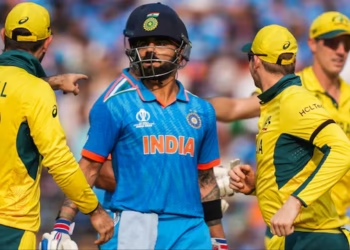Cricket is more than just a sport in South Asia; it’s an emotion. However, when it comes to India vs Pakistan matches, politics and diplomacy often overshadow the game. Despite being one of the most-watched rivalries in the world, India has refused to play cricket in Pakistan since 2008.
With the ICC Champions Trophy 2025 set to be hosted in Pakistan, India’s stance remains unchanged. While other teams, including England, Australia, and South Africa, are set to play in Lahore, Karachi, and Rawalpindi, India will play their matches in Dubai.
But Why India Won’t Play Cricket in Pakistan? Is it purely a security concern, or are there deeper political and financial factors at play? Let’s dive into the real reasons behind India’s decision.
India’s Dominance in World Cricket
To understand India’s influence, it’s essential to recognize its financial and structural dominance in world cricket.
– With 1.5 billion people, India provides the largest cricket viewership globally.
– The Indian Premier League (IPL) is the most lucrative T20 league, attracting top players worldwide.
– The Board of Control for Cricket in India (BCCI) receives nearly 40% of ICC’s total revenue.
– India’s sponsorship and broadcasting deals drive the majority of cricket’s global economy.
This immense financial power means that India’s decisions carry significant weight in ICC events. When India refuses to play in a particular country, it impacts sponsorships, broadcasting rights, and tournament revenues.
Why India Won’t Play Cricket in Pakistan?
1. Political Tensions Between India and Pakistan
The strained relationship between India and Pakistan has been a long-standing issue. The two nations have had multiple conflicts since partition in 1947, and the tensions continue to influence sports.
India’s government, led by Prime Minister Narendra Modi and the Bharatiya Janata Party (BJP), has taken a strong stance against Pakistan due to its alleged links to cross-border terrorism. In December 2022, India’s Foreign Minister S. Jaishankar referred to Pakistan as the “epicenter of terrorism.”
Given these geopolitical tensions, the Indian government does not permit bilateral cricket series with Pakistan, let alone allowing players to tour the country.
2. Security Concerns for Indian Players
One of the main reasons cited for not touring Pakistan is security threats. The 2008 Mumbai terror attacks, linked to Pakistan-based groups, deeply impacted India’s stance on cross-border interactions.
While other teams have visited Pakistan in recent years—including England, Australia, and New Zealand — India argues that their players face greater risks due to their high-profile status.
Cricket analyst Sidharth Monga stated that Indian cricketers are multi-millionaires and among the most famous personalities in the country, making them potential targets.
Despite Pakistan successfully hosting major international series since 2019, including the 2023 Asia Cup, India remains unconvinced.
3. Financial and Strategic Interests
India benefits from neutral venues: India vs Pakistan matches generate millions in revenue, even at neutral locations like Dubai, England, and Australia.
– Pakistan relies on ICC funding: Unlike India, which secures large sponsorship deals independently, Pakistan heavily depends on ICC revenue.
– Sponsorship leverage: India’s reluctance to tour Pakistan pressures PCB financially, limiting Pakistan’s growth as a cricketing powerhouse.
4. Lack of Bilateral Cricket Since 2013
The last time India and Pakistan played a bilateral cricket series was in 2012-13, hosted by India. Since then, all encounters have only taken place in ICC or ACC tournaments at neutral venues.
Pakistan toured India for the 2023 Cricket World Cup, yet India refuses to reciprocate. This selective participation underscores India’s dominant position in international cricket politics.
The Emotional and Cultural Aspect of India-Pakistan Cricket
Despite political tensions, cricket connects players and fans across borders.
– Indian and Pakistani cricketers often share friendships and mutual respect.
– Virat Kohli and Babar Azam have expressed admiration for each other.
– Players from Northern India and Pakistan speak similar languages (Punjabi), strengthening personal bonds.
However, at the diplomatic level, cricket remains a tool for political leverage rather than sportsmanship.
Also Read Dubai Businessman Gifts ICC Champions Trophy Tickets to Blue-Collar Workers
What Could Change India’s Stance?
Cricket experts believe only a major political shift in India or Pakistan could resolve this deadlock.
– If a new Indian government adopts a softer diplomatic approach, cricketing relations might improve.
– If Pakistan undertakes stronger counter-terrorism measures, it could help build trust.
– ICC could push for a mandatory participation policy, forcing teams to play in host nations.
However, at present, none of these scenarios seem likely.
Conclusion: Will India Ever Play Cricket in Pakistan Again?
The India-Pakistan cricket rivalry is one of the most intense and watched matchups in sports history. However, political conflicts, security concerns, and financial leverage have kept India from touring Pakistan for over 15 years.
While cricket fans worldwide hope for a resolution, India’s current stance appears firm. Unless there is a major shift in political relations, it is unlikely that India will play cricket in Pakistan anytime soon.
What are your thoughts? Should India reconsider its decision? Let us know in the comments!











Comments 1